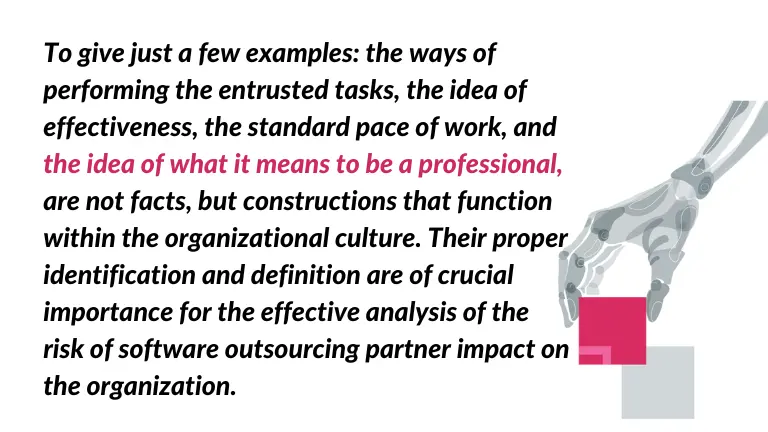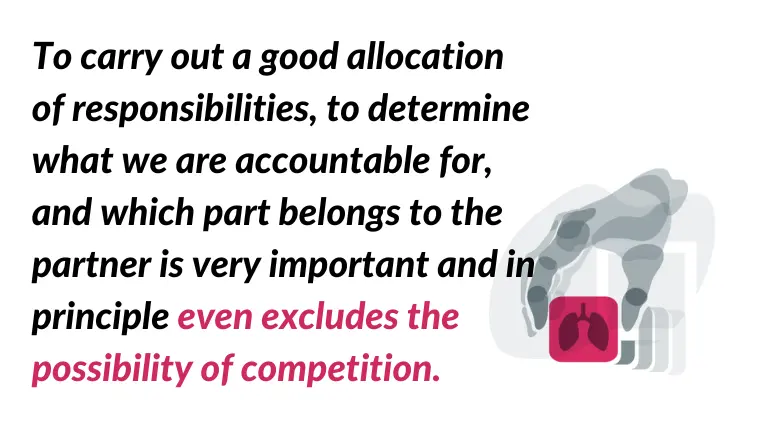Software outsourcing partner and organizational culture – success factors
A few years ago, the Swiss Management Center Working Paper Series published an article by Julie Beardshell, in which the author traced the cultural and organizational culture aspects of a partner in medical software development outsourcing and their critical a project’s impact on its success.
Culture is a powerful human reality that is an integral part of what it means to be a human being in a specific place at a given point in time. People cannot escape from being cultural creatures and having favored value orientations embedded into their ways of doing and thinking. Culture is complex and applies to individuals, groups and corporates. A cultural match between the firm and its vendors is critical to success in outsourcing, yet in practice, few leaders are adept at managing people of different cultures and understanding the influence that culture plays in influencing the success of an outsourcing engagement.
Julie Beardsell: Managing culture as critical success factor in outsourcing, “Swiss Management Center Working Paper Series”
In conversations with various partners, this thread repeatedly comes back like a boomerang. Organizations which are apprehensive of the impact that outsourcing may have on their organizational culture and thus the effectiveness of their employees often have bad memories related to outsourcing. Drawing on nearly 20 years of experience of Graylight Imaging in delivering IT projects in this model, I would like to share a few observations and discuss the most common problem reported by our partners: the employees’ uncertainty about their jobs. In the second part of the text, I will also present 3 ways to address this concern.
Company culture and financial efficiency. Some facts
The decision to outsource is made by organizations based mainly on rational, hard factors. But very often the phenomena that take place in the area of organizational culture make management postpone it. The fact is that the decision to outsource can have a significant impact on the cost stream. So, it requires strategic rethinking. By the way, it is worth remembering the human factor, which is very often crucial in generating revenue.
Organizational culture is one of the most important components influencing the turnover indicators. According to a study conducted at Columbia University, the probability of emploee turnover in organizations with a high corporate culture is only 13.9 percent. Meanwhile the probability of emploee turnover in organizations with a low culture is as high as 48.4 percent. And we all know what a gargantuan sum it entails to acquire a new employee.
Warwick University’s Faculty of Economics conducted a study which showed that satisfied employees are 12 percent more productive than the average employee. And dissatisfied employees are 10 percent less productive. (source)
How and when to tackle the issue?
The decision to start outsourcing cooperation is a decision of strategic importance that may resonate negatively in the organization. We have been working in outsourcing for many years. Well and successfully. Our clients confirmed it in their opinion.
Based on our experience I can say that an important element of risk management related to the resonance of outsourcing decisions among employees is to talk about the values of a given organization already at the stage of formulating an offer or negotiating.
Talk about the organizational culture of your software outsourcing partner
Let’s not just talk about hard data such as the hourly rate or project price. Let’s talk openly about how we work and what we expect from each other. Talk openly about your corporate culture — don’t take it for granted or treat it as a slogan.
Another thing is that in order to prevent a potential negative impact of outsourcing on the organizational culture of your company, you must understand clearly what this culture is in the first place. Let us ask ourselves some questions: what is important in my company, what is meaningful to my people, why do my people work here, why don’t they change jobs? The elements that will appear on this list of answers are exactly the areas that we will should support.
Organizational culture framework
To highlight the complexity and importance of this problem, let me recall the article by Julie Beardshell quoted in the introduction. It contains very interesting graphics, symbolically showing how many areas the term: “culture” comprises. To give just a few examples: the ways of performing the entrusted tasks, the idea of effectiveness, the standard pace of work, and the idea of what it means to be a professional, are not facts, but constructions that function within the organizational culture. Their proper identification and definition are of crucial importance for the effective analysis of the risk of software outsourcing partner impact on the organization.

Once you have prepared such a culture framework, you can see its strong and weak points — I suggest looking at it a little bit critically — it is worth sharing this information with the outsourcing company. Tell us what behaviors you do not tolerate and what behaviors are particularly valuable to you, what you value in your employees and what you value in your partners.
Show your outsourcing partner those aspects of your culture that you absolutely do not want to change or modify. Make it clear what is important. Of course, I realize that this is a very open conversation that requires some trust. But on the other hand, it is really the kind of trust that is worth investing in from the outset, because it reduces the potential subsequent dissatisfaction of your own employees.
A sense of insecurity — the most common blocker
One of the most important and frequent blockers that organizations report to us is the concern of their employees for their jobs and position. Of course, employees may feel at risk, but it is the managers’ job to remedy this situation. How to do that? Below are 3 possible scenarios.
Let’s meet
First of all, right from the stage of formulating the offer itself or even preliminary talks with a potential service provider, it is possible to bring teams from both organizations together. Such a meeting allows you to experiencefirst hand that on the other side there are people who can also be cool. They can laugh at the same jokes, they speak English well and talking to them is no problem.
In Graylight Imaging we have worked with different organizations, with different organizational cultures. Some of them with quite a high degree of corporate formalization, with a tendency to report and meet on the one hand, others, with a more relaxed approach on the other. Among our clients there are large companies, but also smaller enterprises that expect close contact — such as Feedback Medical Ltd., where we conduct very open communication and place great emphasis on interpersonal relations.
We meet very often, the client comes to visit us every month — in fact, we treat one another more like members of one team. Feedback Medical has ongoing access to the progress of the project, sees what problems we are facing — and at the same time the people working on the client’s side do not feel threatened.
Division of tasks with your software outsourcing partner
Another important thing is to make the employees aware of the fact that we, as a software outsourcing partner, cover the competence shortages that the client has in their company and we do not compete with any of their employees.
Of course, we want to advise and help the client, but we don’t want to be internal competition. Our goal is not to replace these people, but to help them — after all, as an outsourcing partner, we are also able to take on tasks which in a sense give less opportunities for development. It is common practice that managers simply ask their people to create a list of tasks they would like to pass on.
To carry out a good allocation of responsibilities, to determine what we are accountable for, and which part belongs to the partner is very important and in principle even excludes the possibility of competition. It is not only a question of the outsourcing, it is generally a question of management in a team. Clearly defined tasks and competences as well as responsibilities ensure that people do not feel competitive towards one another. Just as we should take care of this within our own teams, the same should apply to working with an outsourcing company. Therefore, if the thought “I need an outsourcing company” appears in your mind, then answer the questions why you need it and for what specific tasks. Write them down and determine what kind of things your people are responsible for and what kind of tasks you would like to outsource.
Conduct a risk analysis in terms of organizational culture. For example, if it is important for your employees to undertake ambitious IT projects, make sure that these ambitious projects remain in your company, outsource another part of your work.

Manage the change consciously
From the point of view of managing the engagement, it would be best if the team was able to draw up a list of tasks to be outsourced themselves. If the team were able to say: those are things we are not able to do. It is about involving them in the process of acquiring a software outsourcing partner. The result is best when the contacts and the work on IT project estimations are not executed only by the outsourcing company’s account manager and the manager on the client’s side. The optimal arrangement involves the commitment of the team to which the external team is going to be added.
No one likes to be confronted with a fait accompli. I suppose I’d feel uncomfortable too if I found out suddenly that half my work is outsourced. When we put our employees in such a situation, in a scenario of accomplished facts, there are indeed various negative visions, fears and resistance to this change.
In my opinion, involving your team in the process earlier not only minimizes anxiety but also strengthens the position of the manager. How can we expect to have a team involved in a relationship if we have not given them agency to build it?
Involve your employees in choosing an outsourcing company!
Before you decide to outsource or choose a certain company, involve your people in the process. Give them time to get to know your partner, to see if you are culturally identical. Before you decide to outsource or choose a certain company, involve your people in the process. Give them time to get to know your partner, to see if you are culturally identical.
In a perfect world, you will immediately laugh at the same jokes. But these are the things that will come later. The most important thing is to break the first ice. If we do it before the contract is signed, both parties are already in sort of an “arranged marriage”. And can simply start working effectively.
Additionally, a nice idea to start working in the outsourcing model is to start with small projects, to introduce 2-3 people. If possible, do not start with a large team, which suddenly may outnumber your employees. This can naturally cause resistance — people who have been the majority are suddenly overwhelmed. It is much better to do it in small steps.
Conclusion
I realize that the above text is not exhaustive. But I hope that these good practices will contribute to the success of your project. If you would like to exchange your experiences or consult the issues related to organizational culture and software outsourcing partner, please contact via LinkedIn.
Contact us if you have any questions!